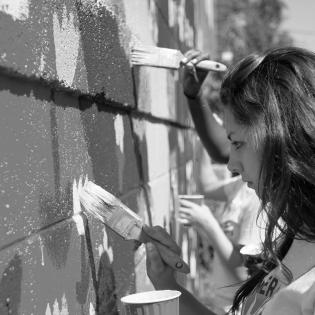Your Place in the Community
Teens identify their roles and personal values, and analyze how their personal values and beliefs developed in connection to their community's values and beliefs. They discuss what decisions they can make through generosity and voice for the common good.
The learner will:
- define and use vocabulary terms related to values and beliefs.
- identify the roles they hold in different situations.
- tools for group collaboration if meeting remotely (Jamboard, Google Docs)
- Brene Brown's list of values
sample values: character, citizenship, obedience, generosity, gratitude, initiative, integrity, justice, conformity, courage, empathy, fairness, kindness, patience, creativity, perseverance, pride, respect, inclusion, equity, leadership
Teens discuss with their families the beliefs and values that are the most important to their family, especially as they relate to the larger community. They prepare a one-paragraph summary or video of their conversation.
Instructions
Anticipatory Set:
Tell the group that each person has developed values and beliefs through their lives and experiences. Some of those are unique to them, and some are developed in their families or in their communities. These values help guide our decision making and behaviors every day. Many people haven't taken the time to name their values, but we are going to do that today and think about how those values guide us and how our values compare to one another.
Display the list of values from Brene Brown's book Dare to Lead. Give silent time for everyone to skim over the whole list. Say, "One of the things that makes us unique is what we value. There aren't better or worse values, but they make us who we are. Showing respect for what others value and believe is one way we are inclusive."
Alternatively, use the list of values in the vocabulary section above.
Give the participants several minutes to write down up to ten of the values that they think are important. Then, have them underline the 2-3 that are most important to them, ones they feel they hold themselves to or aspire to maintain.
Use the Think, Pair, Share model to guide participants to talk about what their two values are (use breakout rooms in a virtual setting). When they "think," they may name the two values to themselves and reflect on why these two are most important. When they "pair" up with someone, they share their two values with each other and discuss whether they have anything in common with their partner. When they "share," they tell the whole group what they value and why (keep a list and tally). As more people share and see similarities and differences, discuss the following:
- Do we all have the same list of values?
- How are these values and beliefs communicated and established?
- Are there right and wrong answers to the question, what do you value?
- Are these the same values we learned at home? At school?
- What are the values and beliefs that we want to continue?
- What do we think we could do better related to our values?
- Is holding your values a want or need?
Ask, "What do you think are the values and beliefs of this community?" (Define what you mean by community here.) Brainstorm a list separately and together. Use Jamboard to collect the brainstormed lists of participants. Talk about the words generated.
Ask participants to share their ideas about how those community values influence them. Are they the same values that showed up in our earlier discussion?
How do our community values determine our values and decisions? How can we influence community values?
Discuss how our values can guide us in a philanthropic project to take action for the good of the community.
Philanthropy Framework
-
Strand PHIL.I Definitions of Philanthropy
-
Standard DP 01. Define Philanthropy
-
Benchmark HS.1 Define philanthropy to include giving and sharing; volunteering; and private individual action intended for the common good. Explain how a volunteer individual/group can act for the common good.
-
-
Standard DP 06. Role of Family in Philanthropy
-
Benchmark HS.1 Discuss the role of family life in shaping a democratic society.
-
-
-
Strand PHIL.II Philanthropy and Civil Society
-
Standard PCS 01. Self, citizenship, and society
-
Benchmark HS.3 Give examples of human interdependence and explain why group formation is one strategy for survival.
-
-
